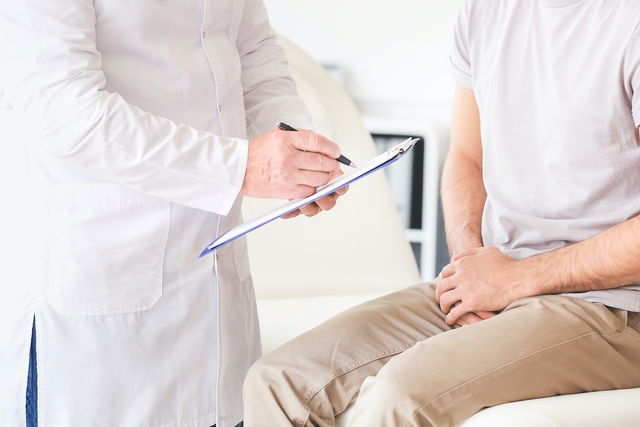HPV in men is sexually-transmitted and can cause symptoms like warts in the genital area, itching and genital discomfort. It is also associated with a higher risk for penile cancer.
Atlhough many HPV infections do not cause any symptoms in men, the virus can be present in the body and can be transmitted through skin to skin contact.
If you suspect you may have an HPV infection, you should consult a urologist for evaluation. If warts are present, the doctor may prescribe medications to help removal or a surgical procedure.

Main symptoms
The most common symptoms of HPV in men are:
- Warts on the head or shaft of the penis
- Bleeding or pain around the warts
- Genital itching
- Genital discomfort
Although HPV in men usually does not cause any symptoms (or just mild symptoms), warts can grow in size and cause discomfort and bleeding during sex. They can also spread to other areas, like the testicles or anus.
Depending on the body part that was in contact with HPV, warts can also grow in the mouth or throat. HPV in men is also associated with a higher risk for penile cancer.
What to do
If you suspect you may have HPV, you should see a urologist for assessment and a peniscopy. This procedure allows for the very close evaluation of the penis skin under a type of microscope.
If warts are present, the doctor may also scrape one or collect a specimen for biopsy to reach a diagnosis.
How it spreads
HPV in men is mainly transmitted through unprotected sex with a contaminated person. Your partner may not have any obvious symptoms or warts. Transmission can occur through vaginal, oral or anal sex.
Using a condom greatly reduces the risk for transmission of HPV, however there is a small risk of spreading the virus through contact with unprotected genital parts, like the vulva or testicles.
Treatment options
There is no treatment available to completely cure HPV. This infection is only cured after the body eliminates the virus naturally.
With warts, treatment for HPV in men may involve removing them, either through irritating or acidic medications (like podophyllin or imiquimode), cryotherapy, laser therapy or surgery.
Men who are confirmed to have HPV should avoid unprotected sex to prevent transmission to other partners.
Is a cure permanent?
HPV infections in men generally resolve on their own without any special treatment. However, it is important for any warts to be appropriately treated. Removing them can help the skin to repair from the infection, reduce the risk for infection and relieve symptoms.
Even after warts are removed, it is common for them to return. Patients are advised to comply with treatment as prescribed.
Prevention measures
The best way for men to protect themselves from HPV is to use a condom for all sexual encounters and to ensure they are vaccinated against HPV.
